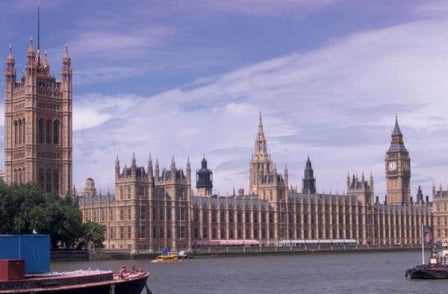
A new poll commissioned by the Media Standards Trust suggests that most members of the public who express a preference back the Parliament-backed system of press regulation.
The YouGov poll asked 1,866 adults the following question:
The Government, through the Privy Council, is currently due to consider two Royal Charters governing press regulation. One is a proposed Royal Charter approved by Parliament, implementing the system agreed by the three main political parties and supported by groups representing some of the victims of press abuse. The other is a proposed Royal charter implementing the system put forward by a number of major newspaper publishers.
Which Royal Charter do you think the Privy Council should approve?
Some 50 per cent backed “the one approved by Parliament”, 13 per cent "the one proposed by the major newspaper publishers" and 13 per cent said neither, with 24 per cent ‘don’t knows’.
The majority of the newspaper and magazine industry is currently pressing ahead with creating a new system of press regulation called the Independent Press Standards Organisation. A Royal Charter to underpin this system, written by publishers’ body Pressbof, is currently being considered by a sub-committee of the Privy Council.
A rival Royal Charter, agreed in a cross-party deal in March, is expected to go to the Privy Council in the autumn. It sets out a system of press regulation which is more independent of publishers, which is set in stone via legislation and which includes a compulsory libel disputes arbitration system.
The survey found that 84 per cent of respondents read newspapers, either in print or online, and it suggested that 59 per cent would want the newspaper they read to be part of a Parliament-backed system of press regulation if that were to go ahead.
In a statement issued via the campaign group Hacked Off, Gerry McCann said: "There is a simple choice before us: the press proprietors' plan or the plan suggested by Leveson and backed by Parliament.
"This poll confirms that the public utterly rejects the proprietors' scheme and wants Leveson instead. They want something effective and independent, something that will protect them from the kinds of abuses we've seen in recent years. The poll also shows that people are fed up waiting for this change.
"The Privy Council needs to see these figures and realise that it's time to end the political manoeuvring and put the Leveson plan into action."
Hacked Off director Brian Cathcart noted that this latest survey comes after publishers “sold” the new IPSO press regulation plan “pretty hard through the pages of their papers”.
He added: “This now looks like one of those issues on which the public has made up its mind and will not be shifted. They expect the big newspaper groups to comply with what Parliament and the Leveson Report proposed, and they will trust nothing less. “
The Media Standards Trust has close ties with Hacked Off.
Here are the other questions and answers from the new survey:
The Leveson Inquiry into the culture, practices and ethics of the press, which started in 2011 following revelations about phone-hacking and other abuses carried out by the press, made recommendations for reform of press regulation in November last year. Generally speaking would you say you are…
- In favour of tougher press regulation: 69 per cent
- In favour of same or less tough regulation: 22 per cent
- Don’t know: 9 per cent
Which of these two statements comes closest to your own view?
Imagine that the new system of press regulation agreed by Parliament did NOT go ahead, and instead the alternative system of press regulation proposed by the newspapers went ahead.
What risk, if any, do you think there is that there would be a repeat of unethical and illegal practices (such as phone-hacking and intrusions into people's private lives) that were revealed during the Leveson Inquiry?
- Large risk: 43 per cent
- Small risk: 39 per cent
- No real risk: 7 per cent
- No risk at all: 1 per cent
How much involvement in running the new system of press regulation do you think the major newspaper publishers should have?
- Some involvement: 44 per cent
- No involvement: 45 per cent
- Don’t know:11 per cent
Imagine the new system of press regulation agreed by Parliament DID go ahead, but some newspaper groups continued to oppose it and did not join the new regulator.
Thinking about the newspaper you tend to read the most, which of these statements comes closest to your view?
- I want the newspaper I read to join the new system of regulation and will be disappointed if they don't: 59 per cent
- I do not want the newspaper I read to join the new system of regulation and will be disappointed if they do: 11 per cent
- I do not really mind either way: 24 per cent
In the arguments around what to do about regulation of the press, how much, if at all, do you trust each of the following?
- Lord Justice Leveson, the judge who conducted the Inquiry: 61 per cent
- BBC News: 61 per cent
- Groups representing victims of press abuse: 58 per cent
- The newspaper you read most often: 47 per cent
- Hugh Grant, the actor who campaigns for press reform: 44 per cent
- Hacked Off, the group that campaigns for press reform: 41 per cent
- David Cameron, the Prime Minister: 34 per cent
- Ed Miliband, leader of the opposition: 33 per cent
- Nick Clegg, the Deputy Prime Minister: 27 per cent
- The major newspaper publishers: 17 per cent
- Rupert Murdoch, the owner of the Sun and Times newspapers: 7 per cent
Email pged@pressgazette.co.uk to point out mistakes, provide story tips or send in a letter for publication on our "Letters Page" blog
